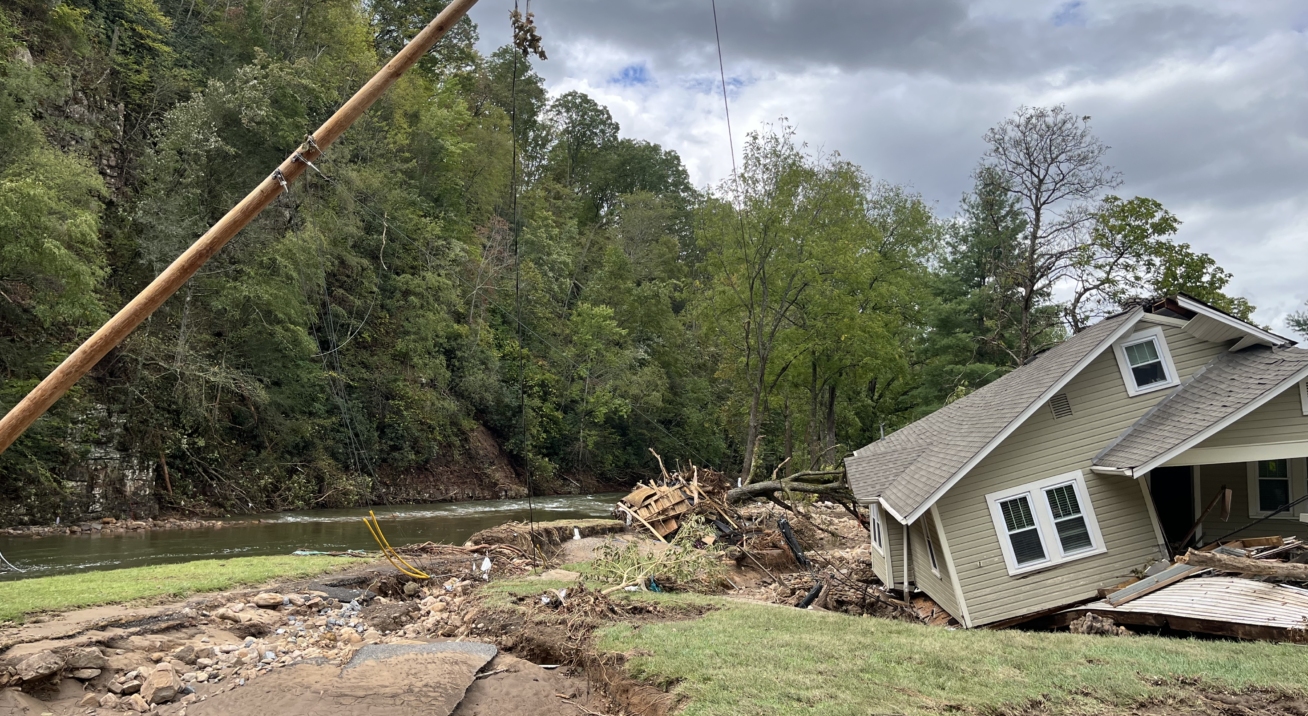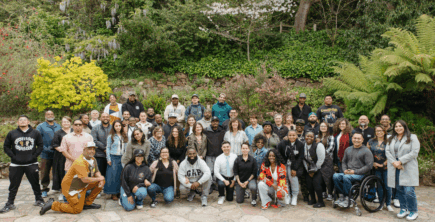
LGBT

Hurricane Helene has left a path of destruction across the southeastern United States and brought unprecedented flooding to communities in Western North Carolina, leaving them inaccessible and unrecognizable. At least 130 people have died across six states, and the death toll is still rising. Road closures continue to delay desperately needed emergency aid, and more than two million households remain without power.
Community-led relief efforts are already underway. While large, well-resourced organizations tend to see a surge in donations after a crisis, we recommend supporting local groups led by those most directly affected by a disaster, with the deep knowledge and relationships to get help where it’s most needed.
Here are 9 recommended organizations that are providing emergency relief, preparing for long-term recovery, and working to address the root causes that helped to create this crisis in the first place.
A former Tides Foundation grantee, Down Home organized a door canvass to collect community assessment surveys 24 hours after the storm hit. In the days since, they’ve continued to build out a community resource database, producing graphics that are shareable by text since many communities still do not have access to the internet. Down Home is partnering with Organizing Resilience to raise public resources into a pooled fund for North Carolina and Georgia that will benefit community groups and local mutual aid efforts.
View this post on Instagram
Based out of McDowell County, North Carolina, Foothills Food Hub works to enhance and promote community health by advocating for an equitable and economically viable local food system to strengthen communities, ensuring local food is affordable and accessible to low-income community members. In the aftermath of Hurricane Helene, Foothills Food Hub is collaborating closely with emergency response teams to gather and disperse critical information on food and water distribution.
View this post on Instagram
BeLoved Asheville is a local nonprofit organization working with on-the-ground volunteers to collect and distribute a wide array of essential supplies, including food, bottled water, trash bags, blankets, first aid, feminine hygiene products, diapers and baby supplies, hand sanitizer, toilet paper, paper towels, propane, cook stoves, batteries, generators, and more.
View this post on Instagram
The recovery needs in western North Carolina will remain great in the months and years to come. To support the region, NCCF is accepting donations for its Disaster Relief Fund, which will provide grants to organizations on the ground in affected communities to support long-term recovery from Hurricane Helene.
The Community Foundation of Sarasota County’s Suncoast Disaster Recovery Fund was established in 2022 in response to Hurricane Ian’s catastrophic impacts across the region. The fund is specifically focused on mental and behavioral health, legal services, case management, children and youth services, as well as efforts identified by Long Term recovery groups within each county. Such efforts include repairing homes, along with replacing damaged furniture and appliances. Contributions to this fund will be dedicated to long-term recovery efforts, which tend to be identified six or more months following an event after emergency disaster response efforts have concluded.
The Tampa Bay Resiliency Fund helps organizations providing assistance to the most vulnerable of residents impacted by disasters. The Fund is a strategic collaboration of Allegany Franciscan Ministries, Foundation for a Healthy St. Petersburg, Pinellas Community Foundation, and United Way Suncoast, and has been activated to aid organizations helping those suffering from the effects of Hurricane Helene. Priorities for funding include emergency food, water, shelter, and other basic needs, necessary services, and general support that allows local organizations to continue or expand their services at this time.
In the wake of a disaster, one of the most critical challenges is often a gap in connectivity. Vital information cannot be shared, coordination between agencies can be delayed, and survivors are left isolated and unable to reach out for help. ITDRC provides connectivity, volunteer support, and technology services to communities and relief organizations impacted by disasters. ITDRC collaborates with public-sector organizations including local, state and federal emergency management, and public safety agencies to eliminate connectivity and technology barriers in order to help communities and survivors heal more quickly. In the wake of Hurricane Helene, ITDRC is positioned to provide connectivity and charging stations throughout the affected areas as soon it is safe to do so.
Created in response to the Maui wildfires in 2023, Tides Foundation’s Crisis Response Fund moves quickly in the aftermath of US–based crises to help communities historically denied power rebuild. By responding to emergencies that threaten the progress of Tides’ priority issue areas, we fuel short-term recovery and long-term resilience.
Support for the Crisis Response Fund is an investment in Tides’ ability to mobilize quickly with emergency support for marginalized communities in crisis, to resource communities harmed by compounded crises, and to shift power to proximate community leaders.
The Hurricane Helene Response Fund has already committed $110,000 to the organizing and mutual aid groups on the ground that are working around the clock focused on the following priorities: Direct relief and mutual aid; Economic relief and recovery; Accountability; and a Push for Structural Change. Contributions to the Hurricane Helene Response Fund, housed at Amalgamated Foundation, will go towards expanding the fund’s initial set of grants.
If you’re considering a grant in response to a crisis, we strongly recommend providing general operating support and not requesting formal reports. Learn more about best practices for crisis response grantmaking.

LGBT

Corporate Partners

Philanthropy

Read the stories and hear the voices of social change leaders fighting for justice.